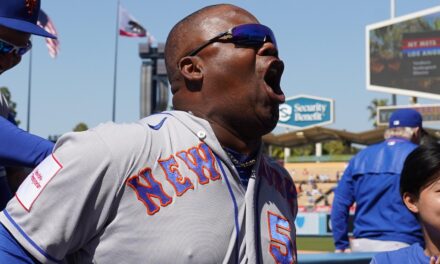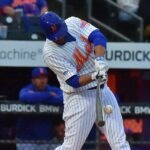When 21-year-old Darryl Strawberry made his major league debut with the New York Mets on May 6, 1983, against the Cincinnati Reds at home, fans were eager for an impact player to help turn the organization’s fortunes around.
After all, the club hadn’t made the postseason since they lost to the Oakland Athletics in seven games in the 1973 Fall Classic. In addition, the Mets hadn’t posted a a regular season winning percentage above .500 since they went 86-76 in 1976.
The lean, six-foot-six prodigy out of Crenshaw High School in Los Angeles had lofty expectations to be the next great superstar in Major League Baseball. Poised with a beautiful left-handed swing, a ton of power and exceptional speed, Strawberry showcased his abilities right away.
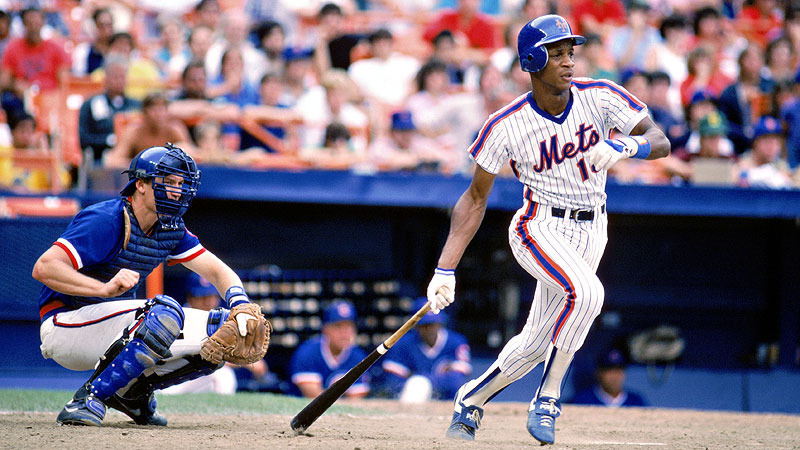
In 1983, Strawberry became the first position player in franchise history to win the National League Rookie of the Year, slugging 26 home runs, swiping 19 bases and posting a 134 OPS+. Strawberry hit seven more home runs than the Mets’ previous rookie record holder in Ron Swoboda (19, 1965). Strawberry’s single-season mark lasted until 2019, when Pete Alonso shattered it with 53 homers.
From 1984 through the 1991 season, Strawberry made eight consecutive All-Star teams (seven with the Mets), was co-winner of the 1986 Home Run Derby with Wally Joyner, won a World Series championship in 1986, recorded a 30/30 season in 1987 and led the National League in home runs in 1988 (39).
Strawberry was a dominant force at the plate all throughout the eighties. Among 182 players with a minimum of 3,000 plate appearances in that decade, Strawberry ranked sixth in wRC+ (143) and second in isolated power (.259). His combination of power and speed made him a threat not only at the plate, but on the bases. No player posted more seasons of 25+ home runs and 25+ stolen bases in the eighties than Strawberry with five.
Over his first nine seasons, Strawberry hit 280 home runs and stole 201 bases. He’s one of three players in Major League Baseball history to record 250+ homers and 200+ stolen bases in his first nine seasons, along with Barry Bonds and Mike Trout. Strawberry is also one of five players to record 250+ homers, 200+ doubles and 200+ stolen bases before turning 30, joining the aforementioned Bonds and Trout, along with Hall of Famer Willie Mays and Alex Rodriguez.
While Strawberry was an important fixture in Mets history, fans have always pondered what type of numbers he would’ve posted had the temptations and vices not been so prevalent throughout his career. The struggles and issues Strawberry encountered are well-documented, though, for the now 61-year-old, he’s found a new lease on life.
Strawberry and his wife, Tracy, founded Strawberry Ministries, in which Darryl travels around the country more than 250 times a year to deliver sermons and use his own experiences to aid others in times of need.
While his ministry work takes up the majority of Strawberry’s time, he will return to his baseball roots next year when the Mets retire his uniform number. No. 18 will join Willie Mays’ 24, Keith Hernandez’s 17 and Mike Piazza’s 31 as the only position players to have their jerseys retired by the Mets.
I had the pleasure of interviewing Strawberry over the phone, where he discussed almost quitting baseball in his second year of pro ball, instructors who were influential to his early development and what it means to have his number retired by the Mets.
MMO: Who were some of your favorite players growing up?
Strawberry: I looked up to Pete Rose. That was one of my favorite players, along with Dave Parker.
MMO: What are your memories from the 1980 MLB Draft, and all the fanfare that came with your high school career?
Strawberry: I remember my junior year we went to the city championship, and we went to Dodger Stadium. We had a great team. We had, I think, four players that got drafted off that team. We played in Dodger Stadium and we lost to Granada Hills. I remember the third baseman came in to close out the game, and the third baseman for Granada Hills was John Elway.
It was a big deal because we were an all-Black team, and they were from the valley and all white. Our coach was white, so it was a really big deal going into that city championship.
We had a great run in the playoffs. We crushed everybody and we were favored to beat Granada Hills. I remember Elway was a draft pick by the Royals in 1979, but he was also headed to Stanford to play football.
MMO: Heading into your senior year of high school, did you feel a lot of pressure knowing that you had the chance to be a top draft pick?
Strawberry: I think it was more excitement than anything. When I went into my senior year, I came out of basketball season and I had one day of baseball practice before the season started. My first day out on the baseball field, I had to practice and the next day we had a game.
In my first game, I remember about 50 scouts being there. My baseball coach used to follow me when I played basketball. I used to dunk on people and he didn’t want me to get hurt because he thought I might hurt my ankle or something. He knew there was a lot of attention focused on me, but he didn’t tell me during the course of my basketball season.
Once I got going into baseball season, he said, “I didn’t want to put that kind of pressure on you. I knew there was going to be a lot of attention focused on you. A lot of scouts are always calling in asking about you, and asking me what kind of player I think you can be.”
A lot of scouts thought I would be the next Willie McCovey, or compared me to Ted Williams. He (Strawberry’s high school coach) was being extremely careful about not trying to compare me to all of that. He just wanted me go out and play.
The first game of the season, I think I struck out three times. I just came from basketball and only had one day of practice, and all of these scouts were coming.
Obviously, I got going. And when I got going, it was real. They saw me and saw me play well. They saw me hit the ball a long way during my senior year. Once I got going, they realized that I was probably going to be the number one pick, and the Mets had the number one pick [in 1980].
MMO: Going from amateur baseball to professional ball, were there one or two specific challenges you faced?
Strawberry: Yeah, it was a culture shock! I went from Los Angeles to Kingsport, Tennessee, a long way from home. I kept calling my mom, and said, ‘Mom, I don’t know if I even want to do this.’ She said, “No, you wanted to do this. This is what you wanted to do for your life. You made the decision, so you’re going to have to stick with it.”
I went to Kingsport, and I was only there for about a month of my first year. Chuck Hiller was my manager. He was a great guy, loose and easy for me.
The next year, I went to Lynchburg, Virginia, and that’s where I almost came close to quitting. I was deep somewhere in the backwoods playing baseball, and there was a lot of racial things being said about me. I was called all kinds of names.
I remember my manager, Gene Dusan, always being good to me. I love Gene Dusan. He was a good manager for me because he kept me together, and he told me not to look at the stands when people were yelling at me. He said, “Don’t look up there. Keep your focus on the field.” He would always get in my face about that because I think he thought that I would take a bat and run up there and start eliminating people.
They were saying some crazy stuff in Lynchburg, Virginia. It was just something I had to learn. If I was going to play, I had to learn to get used to this. I was 19-years-old and thinking, Okay, this is what it’s going to be like.
I came close to quitting, I didn’t show up to the ballpark one day. I had a roommate that I was staying with and I stayed home with him. They thought I went AWOL and was just smoking weed. I was like, ‘I’m quitting baseball.’ My roommate said, “Yeah, you don’t have to deal with all of this craziness.”
The organization was so worried about me and they came down. Lloyd McLendon was sent down. He was supposed to be on that team, but he broke his wrist in spring training, so he had to stay in extended spring. We were supposed to be roommates and he was like a big brother, and I was close to him.
He came to the park and saw me and said, “What’s going on?” He sat me down and we had a real talk. He told me I needed to get it together and to focus, and that I’d make it to the show one day. He told I had to deal with it, even though it was tough. I was a young kid and Lloyd was a little bit older, he went to college and everything.
I came close to quitting and they said to just give it another year. I gave it another year and went to Jackson, Mississippi, and I hit 34 home runs and stole 45 bases [in 1982]. Gene Dusant was my manager again. I realized there, from that season, that I became a ballplayer.
MMO: I’ve read that following the ’82 minor league season, you played winter ball in Venezuela. From the article, it seemed like playing in Venezuela was instrumental in your overall development.
Strawberry: Venezuela was great because the competition was different and very strong. It really took me to another level because if I was going to play, I was going to have to play against this kind of competition, and I knew that.
The Venezuela competition was a mix of guys who had been to the big leagues and in Triple-A. And here I am, 20-years-old, and I’m playing down there. Once I got going, I hit the brakes off of the ball.
A lot of the other guys I was playing with had already been to the big leagues, and they were telling me that I was going to the big leagues the way I played. They told me to just keep plugging away, work hard and keep playing. And I did.
I developed that year going to winter ball. I came back the next year and went to Triple-A to start the season. I got off to a good start. I came to the ballpark one day and I wasn’t in the lineup. I’m like, ‘Davey [Johnson], what’s up? I’m not in the lineup.’ He told me to come into his office, and he said, “I’m not playing you today because you’re going to the big leagues tomorrow.”
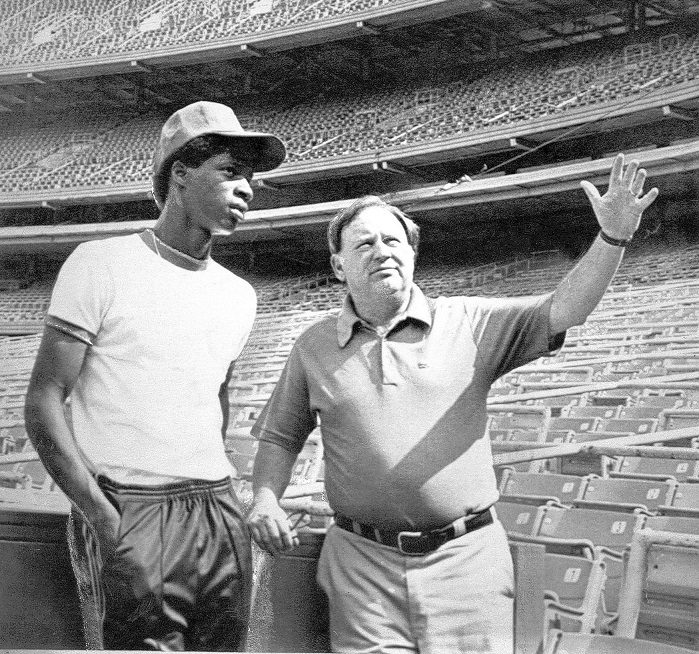
MMO: It must’ve been surreal to hear those words as a 21-year-old.
Strawberry: It really was. Getting there and feeling the expectation, and I got off to a really rough start. I was young and I just remember that I was supposed to be at the park at one o’clock to meet with Jim Frey (hitting coach), and I didn’t show up until between two and three. Frey came up to me and got in my face. He just looked at me and said, “I’m never going to wait for you again. If you want to be great at playing this game, you have all the tools, kid, you need to be at this ballpark early every day.”
From that day forward, I was there every day. He taught me a valuable lesson: it doesn’t matter what kind of talent you have, it’s the kind of work that you put in that will eventually take you to the next level to be great. He told me you can have the talent, but if you don’t work on things that you’re weak at, you’re never going to improve yourself. And I did. I improved and I climbed the ladder.
He pushed me that year and I climbed the ladder. I just came into my own. I went on to win Rookie of the Year. I always say I won Rookie of the Year because Jim Frey got in my face, and made me understand the importance of being here. Not just showing up to the ballpark to say, okay, I want to play, but being there and doing things that’s going to get you to the next level.
MMO: When did you start to utilize the leg kick in your swing?
Strawberry: I didn’t really have that coming out of high school or the minor leagues. I think I started really developing that once I got to the big leagues. I changed that and I think a lot of people thought, well, I don’t think he’s going to be able to hit like that to be successful at the major league level. I just crafted that inside of me and I realized that this is what I want to be.
You have to figure out what kind of player you want to be. Do you just want to be all or nothing? I got a chance to watch players and play with guys like Dave Kingman, and watch him hit and see how he was; it was all or nothing. Do you want to be that type of player, or do you want to be a player that can use your ability to use the whole field and run the bases? I wanted to run the bases, I wanted to steal, I wanted to play the field. I wanted to be a complete player.
I just didn’t want to be a player where it was all or nothing, because it could’ve easily turned that way. I worked so hard not to do that. Once I got to the point with a high leg kick and got comfortable with it, I knew who I was then. I knew how to do it well.
MMO: And how did utilizing the leg kick aid in your performance at the plate?
Strawberry: I called it a lift up and separate. Just lift up and keep my balance. Once I wanted to explode on the pitch, then I would separate. I would put it forward and then put it down. I wouldn’t go so far out because it would keep me in a place where I had great balance, and I wouldn’t fall off the ball a lot.
MMO: Throughout your career, did you incorporate any specific hitting drills into your routine? When I interviewed Gregg Jefferies for Metsmerized, he spoke about a plethora of drills his dad taught him at a young age.
Strawberry: No, no. I don’t think I wanted to clog my brain with all kinds of craziness. When you get to the big leagues, you have to find out what kind of player you are. Eventually, what’s going to happen is, it’s going to catch up with you. Pitchers are going to catch up with you, and they’re going to know how to pitch you. They’re going to find your weaknesses. You have to be able to make those type of adjustments for yourself.
I realized, more than anything, that it was important to stay with who I was. When I would struggle, I would never go to the ballpark and go into BP trying to hit the ball out of the park. It’s only five o’clock, they don’t count. [Laughs.] I would work from the left field line to over the shortstop, and then I would go back into maybe hitting the ball to right-center and right field line. You kind of worked all the way around. I got a feel for what the game is going to be like because somebody is going to pitch me out there, and when I see that pitch I can identify that pitch because I’ve worked on it.
I used to go down to the cage with Bill Robinson, and he used to work me. My favorite thing with Bill Robinson was soft toss. He didn’t get me in a place where he wanted me, and to swing just to be swinging. He wanted me to stay on the baseball, and he wanted to soft toss it and wanted me to hit it just into that left field screen. He’d tell me, “Remember, stay on the baseball and hit it to left-center. When you do that, it’s going to allow you to stay on the baseball, and when the pitcher comes in, it’ll be an automatic turn.”
Those are the things that I learned as time went by, and I became better at what I was doing.
MMO: When you debuted with the Mets in 1983, were there certain players that took you under their wing?
Strawberry: Not really. It was more of a veteran-type of team. I think it was a team where a lot of players were on their way out instead of in. The guys that really helped me a lot at that time were Mookie Wilson and Hubie Brooks.
All of the other guys were good to me. A lot of them were very nice and knew that I was on the scene for real. I think when they saw me in spring training, and saw me play in some of the A games and hit a couple of bombs off some good major league pitchers, they knew. They were like, “Man, this doesn’t even faze the kid.” I got close to Ed Lynch, but Hubie and Mookie were really the guys who encouraged me.
And then when Keith [Hernandez] came over, he had a great impact on my career. He had a great impact on me going forward because I learned a lot from him.
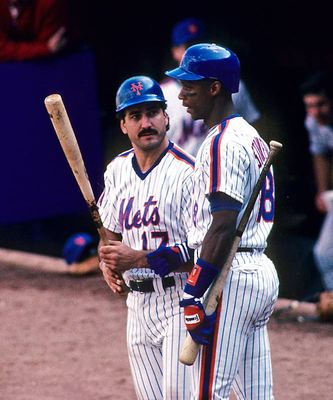
MMO: At what point did you start to notice that the organization was changing, and for the better?
Strawberry: I realized that when we acquired Keith. I didn’t know if he was going to stay, but once I realized what kind of player he was going to be able to bring to the table, it was going to help all of us.
I knew the players we had in our farm system. I knew there was a bunch of them behind me that were very talented like Doc [Gooden] and Lenny [Dykstra]. The Mets organization was stacked with players. We had tons of players who could play.
I think they realized that we had some pretty good players, and then we had some pretty good pitching. We traded for Ronnie [Darling] and we got Sid [Fernandez]. You saw them and knew the organization was starting to make a move. Frank Cashen was a wizard at what he was doing.
MMO: Would you characterize leaving the Mets to sign with Los Angeles Dodgers following the 1990 season, as your biggest regret of your baseball career?
Strawberry: Most likely. It had nothing to do with L.A., it had to do with me being accustomed to playing at Shea Stadium in New York City, and being used to the atmosphere and what the fans were like. The fans push you in New York, and they boo you when you suck. I loved that.
It was a challenge for me because they were like, “You suck,” and I’m just like, ‘Yeah, you’re right. I’m a good ballplayer and I shouldn’t be playing this bad.’ I was never someone who took that personally. I was always taking that as, you can play better than this.
They were right about that and that’s what I loved about the push. Either you’re going to deal with it or they’re going to run you out of town. They have the right to let you know that you suck. There’s nothing wrong with that. You’re getting paid a lot and they come to the ballpark every night to see you play, and they want to see you perform. That’s the thing I loved about them. They don’t want to hear excuses about having a sore this or that.
MMO: I recently watched the Netflix documentary about Mike Veeck called ‘The Saint of Second Chances.’ Part of the documentary details your time with the Saint Paul Saints in 1996. In it, you say that your time with the Saints reignited your love for the game. Can you talk about that?
Strawberry: It brought a lot of joy. I think the way the people in Saint Paul were in general, they just came out to the ballpark and had fun and cheered for you. I got on the baseball field and I didn’t even know if I wanted to play again. But once I got on that field and started playing, it became fun again.
I started to see the game for what it really was from when I first started, and I had joy in it. It just brought a lot of joy to me to be able to be down there playing like that. I didn’t know if I would ever make it back [to the majors]. I just knew if I was going to stay, I was just going to make it my last run to prove to myself how good I was at this game, and how good the game had been for me.
MMO: In your prime, you had a combination of power and speed that was pretty special. Only two players in Major League Baseball history have hit 275+ home runs and swiped 200+ bags in their first nine seasons: yourself and Mike Trout. What memories do you have about those two tools?
Strawberry: It was just something I took a lot of pride in. It was something that I worked at because becoming a base stealer means you have to work at that. That just doesn’t happen overnight.
You have to learn how to get real good jumps, run on certain pitches and be able to pick your spots. That takes a lot of work. It takes a lot of wear and tear on your body because, eventually, your body starts to break down and you start to have injuries as you get older, at 28-29, because you ran so much earlier. That’s what it was for me, and I’m quite sure that’s what it is for Trout. He probably ran a lot and that’s probably why he’s having so many different injuries.
The wear and tear on your body is hard. If you’re just a base stealer, that’s one thing. But if you’re that and a home run hitter, that’s a different thing because that’s very hard to do. It’s not easy to keep that pace up. It’s a very challenging pace to keep up.
MMO: You mentioned putting a lot of work into becoming a great base stealer. Can you expand on that?
Strawberry: I just picked my spots and realized what kind of pitchers were on the mound. Does he have a good move? Who’s behind the plate? Is he quick enough? Getting jumps were important, and you had to learn how to do that.
MMO: The 2016 ESPN “30 for 30” about yourself and Doc Gooden was extraordinary to watch. Was it enjoyable getting to see Doc in person, and relive all the good and bad of that time?
Strawberry: It was. It was great for me to be able to walk down that line again, and look back and realize we were pretty good. I really wasn’t thinking about baseball a lot, and I don’t that much today. When I get a chance to revisit that and look back on it, I’m like, Wow, we were actually pretty good!
You don’t ever think about it when you’re playing. And every year you go out there and you’re determined to be successful and win. When I got a chance to reflect back on that, I could see the good of us and then I could see the fall of us. The lifestyle comes with it too, the expectations and playing in New York and all the temptations. That’s real life and it’s there, you can’t deny it.
We were very young. I was very young! When we won in 1986, I was 24, and we never won again. We came close in ’88, and blew that and lost to the Dodgers. The window of time for winning is not forever. I think players sometimes think that we can keep doing this and we’re going to win. That’s just not the case. That’s not how it happens, because it’s so hard. When I look back on that “30 for 30,” it was really touching to me to see where I was when I started, what happened and where I ended up at.
MMO: Can you talk about when you found out that the Mets were retiring your No. 18 in a ceremony next season? What were your initial reactions to that news?
Strawberry: I was overjoyed when I got the call from Steve [Cohen] that this was happening for me. After all these years playing so hard and spending eight seasons there, and becoming the player I was and the things I accomplished in that short period of time, I’m grateful for that. It’s such a big honor.
I was in tears – tears of joy – for being recognized. Not that I needed recognition for what I did in New York, but being recognized for that part of my career. When I look back on that, I was the first piece of what the organization was able to do. I came up in ’83, Keith came over, Doc, [Gary] Carter, and then we came on. More and more pieces came together, and we were all a big part of that.
You can ‘t take that away. Seven straight All-Star Games, Rookie of the Year, 30/30 and leading the league in homers in ’88. I just think, Man, I did some pretty good things over in Queens. Sometimes you never realize that because you don’t look back on that a lot. I didn’t. When I had the chance to look back on that, I thought to myself, This was well done. I’m really grateful for the fact that I’ll be able to be celebrated in front of all the wonderful Mets fans that had the chance to see me over the years.
MMO: What are your thoughts on Steve Cohen as an owner?
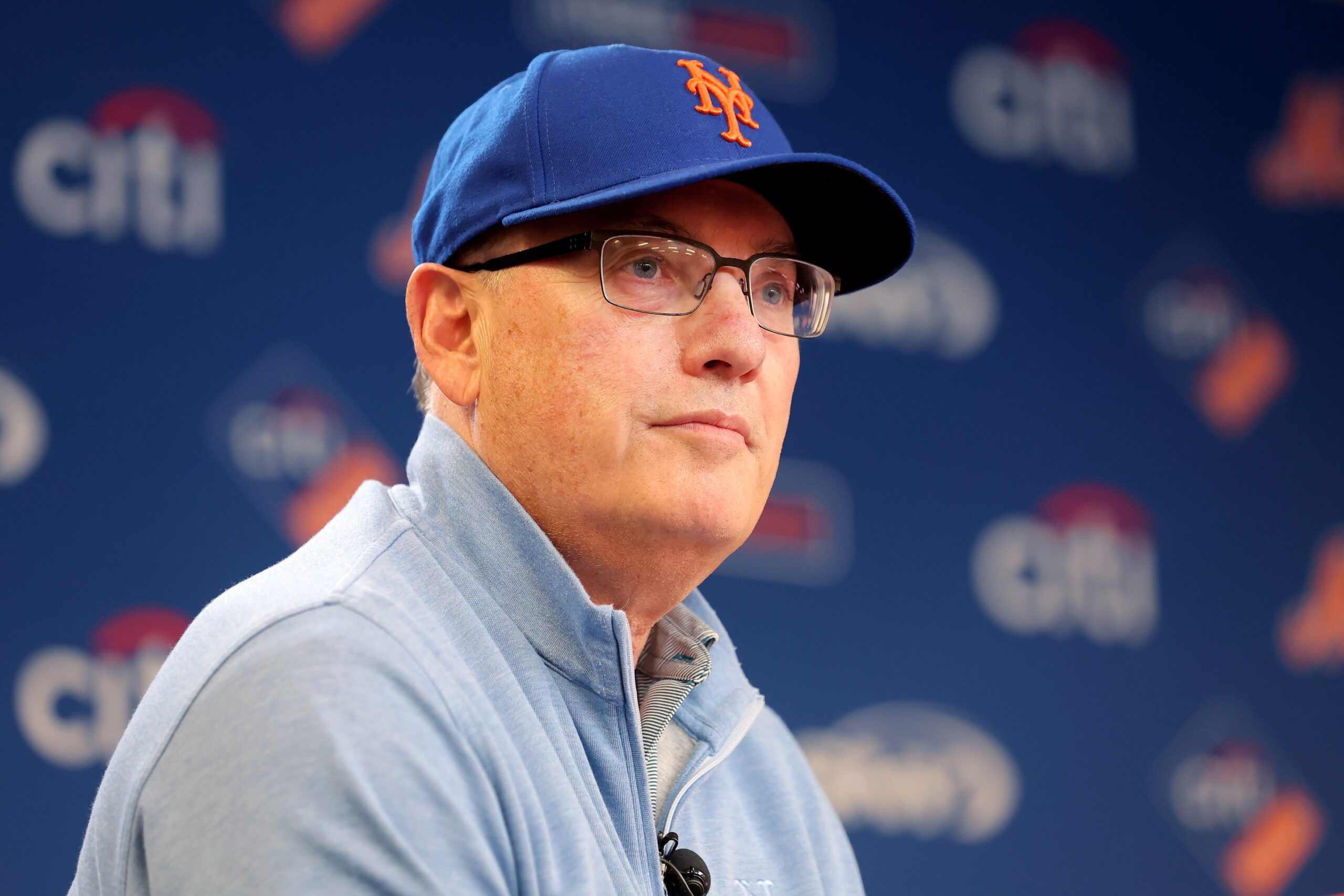
Jun 28, 2023; New York City, New York, USA; New York Mets owner Steve Cohen speaks to the media during a press conference before a game against the Milwaukee Brewers at Citi Field. Mandatory Credit: Brad Penner-USA TODAY Sports
Strawberry: I think Steve Cohen is a phenomenal person. I think he cares and he wants to win. I think it’s about getting the right chemistry and getting the right baseball people for him for development and the minor league system.
I spoke to him a few times and said, ‘You’ve got to get younger. You’ve got to get athletes. Get some guys that can do it all together: run, steal bases, go first to third.’
You need those kinds of players on your team. You need the Lenny Dykstra’s and Wally Backman’s on your team. Those are the players that will help you get to the next level, because that’s what helped us go to the next level. We had the big boys, but if you didn’t have the little guys, it doesn’t do us any good. They were always on base and giving us an opportunity to drive them in.
MMO: I know you’ve been quite busy over the last decade-plus with your ministry and other ventures. Can you talk about what you’ve been up to over that time?
Strawberry: I’ve been involved in ministry for a while now, it’s turned out to be my life. I use my life experiences and am able to go back and help others. I go to maximum security prisons and speak to the inmates there that will probably never see the streets again. Something’s happened in their life, just like stuff happens in all our lives, they need to know that people like me and all the people who are in ministry really care about them.
You never forget about people. I didn’t want anyone to forget about me, and they didn’t. I had people who helped me. I learned that lesson when I got well, and completely well, not straddling the fence and just saying I’m well.
Putting on a uniform made me a baseball player. I didn’t become a man until I stepped out and found my faith, and started living according to biblical principles. And my life changed forever. Now I know the importance of what it is to help somebody else. That’s probably more satisfying to me than anything I’ve ever accomplished.
MMO: Do you travel all across the country?
Strawberry: Yeah, I travel around 260 to 270 times a year to all kinds of churches and events.
I speak for addiction, I’m actually speaking at an event tonight in Orlando. It’s an organization called Teen Challenge, it’s for people who have addiction problems. It’s a faith-based program to help them understand that they need a spiritual awakening in their life to become a different person. To be able to see clear and understand that you can go on with life even though you have fallen short and had some cracks. You can get up and get yourself together.
I became an evangelist after many years of struggle in my life. Playing Major League Baseball and having success and struggles, through drug addiction, prison and cancer twice. Now, I’m a traveling evangelist standing in pulpits preaching over 260 times a year and bringing hope.





